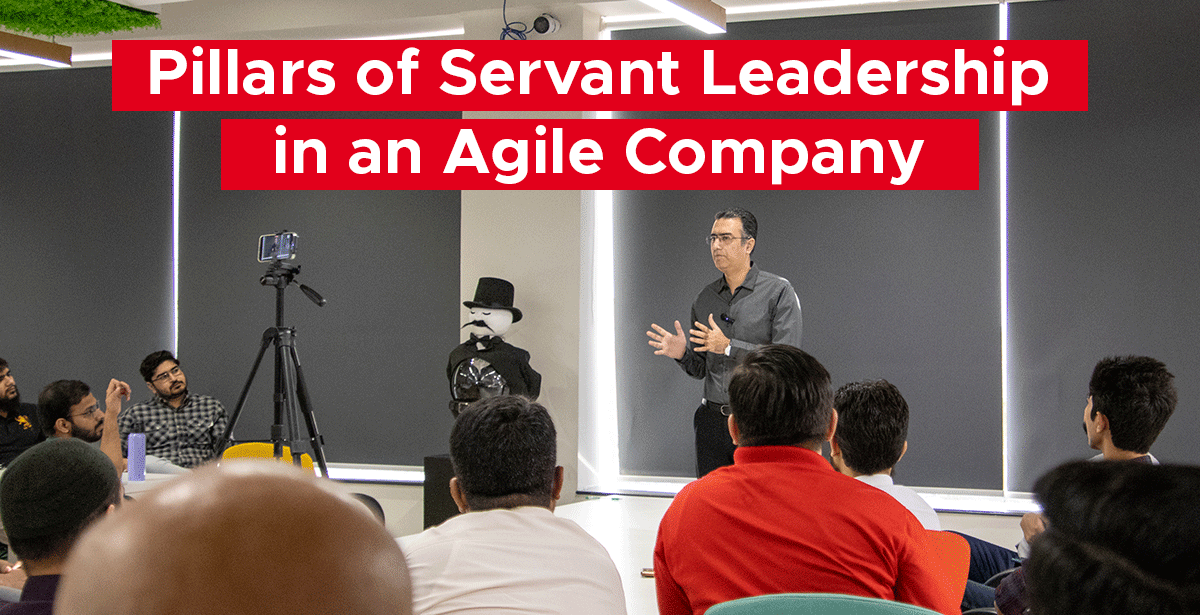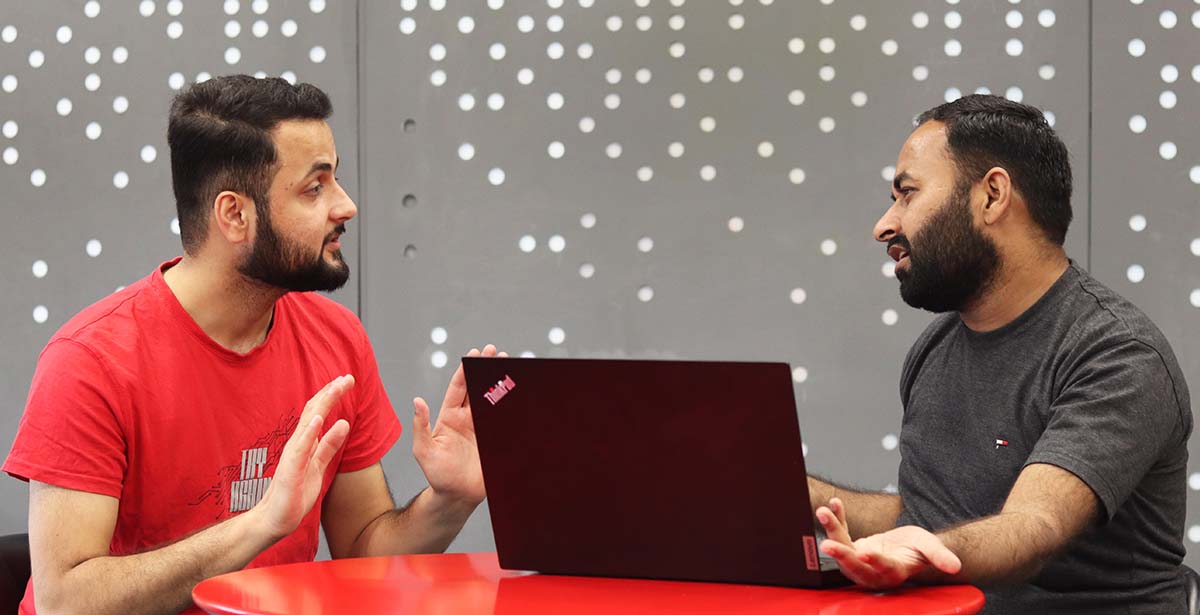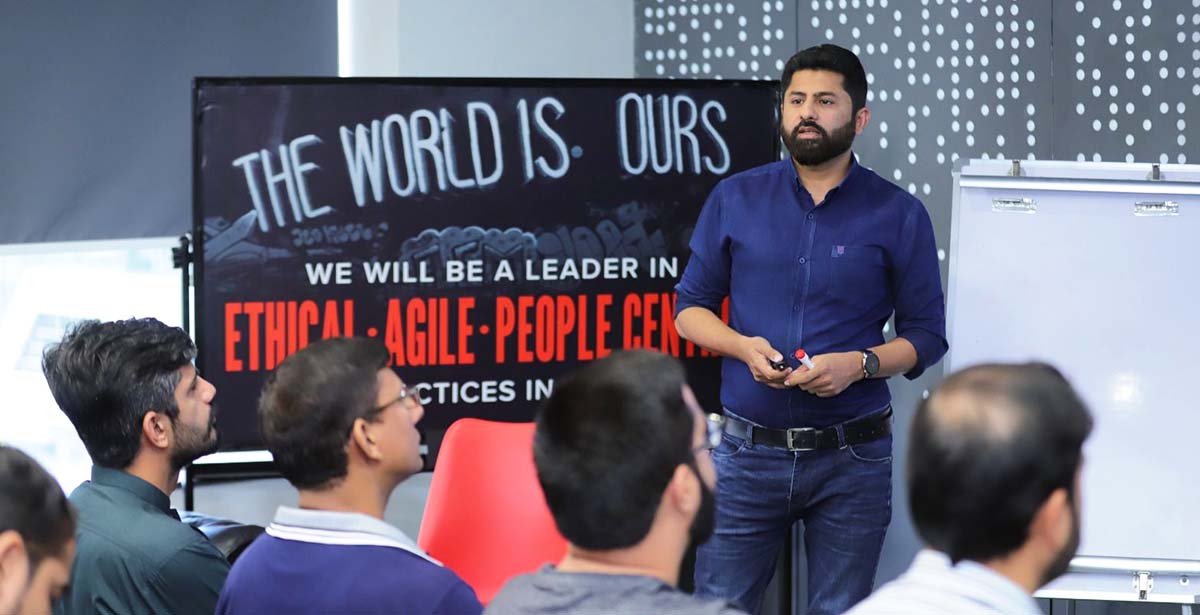Pillars of Servant Leadership in an Agile Company

Servant leadership is a superior, progressive leadership paradigm that allows organizations to reinvent themselves. As part of an Agile company, it can foster empowerment, collaboration, and trust among other desirable traits.
However, for it to truly be effective, servant leadership requires a few things.
But First, What Is Servant Leadership and Its Benefits?
Servant leadership has become a buzzword, drowning its true meaning at times.
In essence, servant leadership entails putting the needs of a group over leaders’ own needs. This fosters trust by holding leaders accountable. Moreover, they help others grow by appreciating them, sharing power, and truly listening to them without judgment.
This term was coined by Robert K. Greenleaf in the 1970s, long before Agile came into being. According to his essay “The Servant as Leader” –
The servant-leader is servant first… It begins with the natural feeling that one wants to serve, to serve first. Then conscious choice brings one to aspire to lead.
That person is sharply different from one who is leader first, perhaps because of the need to assuage an unusual power drive or to acquire material possessions…
The leader-first and the servant-first are two extreme types. Between them there are shadings and blends that are part of the infinite variety of human nature.
The difference manifests itself in the care taken by the servant-first to make sure that other people’s highest priority needs are being served.
The best test, and difficult to administer, is: Do those served grow as persons? Do they, while being served, become healthier, wiser, freer, more autonomous, more likely themselves to become servants?
And, what is the effect on the least privileged in society? Will they benefit or at least not be further deprived?
Based on this, servant leadership delivers the following benefits to those who truly adhere to it –
Growth of Team and Their Wellbeing
Leaders in this model make the growth and well-being of their teammates a priority. They work towards helping the team meet its priority needs while putting their own personal and professional needs second.
Servant leaders also help by removing obstacles which can impact the growth of the team and its success. That’s why their role mandates they be great facilitators and motivators who can inspire people.
Valuing Wisdom and Knowledge
In traditional leadership models, a leader tends to be the sole source for knowledge and wisdom. That’s not the case with servant leaders.
Every member of the team has a role in the decision-making and problem-solving process. Their knowledge helps achieve collective goals, allowing the organization to run smoothly. Especially as statements like “that’s not my job” are eliminated from people’s mindsets.
No Fear Culture
This benefit alone is one of the reasons this form of leadership is a great fit for DPL. Our culture ensures every voice is heard loud and clear across the company.
In fact, we launched the DPL Improvement Board to allow Rebels to add suggestions that can help us improve company wide.
In addition to transparency into challenges facing teams, the board offers problem solvers a chance to drive change. For instance, any improvements in Workforce 4.0 can easily be picked up by our innovative IoT specialists.
That aside, servant leaders ensure employees can say their opinions without fear.
Teams know they can be genuine without fearing penalties or loss of recognition. Especially as the servant leader is known to be unbiased and a sympathetic listener.
Supporting Agile
This leadership form is an important aspect of any Agile environment.
Agile projects have a high level of uncertainty. That’s why they require individual creativity for finding a solution. This, in turn, demands that a team be empowered on a regular basis.
Agile projects have a high level of uncertainty. That’s why they require individual creativity for finding a solution. This, in turn, demands that a team be empowered on a regular basis.
As you can see, this softer leadership style can be a great asset for an Agile IT tech company.
How to Get the Most from Servant Leadership
For an Agile company to benefit from this form of leadership, a few important criteria should be in place. These are the pillars of this concept, making them vital for its success.
Flat Culture
Flat culture is still one of the aspects most organizations struggle to achieve.
Such a culture promotes having almost no levels of management across employee levels. It blurs hierarchal lines to encourage a sense of equality among everyone within the company. This, in turn, has everyone invested in the company’s business performance.
So, what makes a flat culture essential for the success of servant leaders? Here are some quick points.
- Trust is an integral factor in flat cultures. Managers need to trust that their co-workers can make good decisions and contribute effectively to the team.
- Organizations with a flat culture enjoy a more streamlined communication process. Teammates listen more effectively and can exchange feedback immediately without fear. However, most importantly, there’s no need to check with one tier of management or await approvals.
- Like trust, freedom is established in all matters. There won’t be someone hovering over the team and calling the shots. Instead, creativity is valued and voices are heard.
With these values in place thanks to a flat culture, a servant leader can effectively carry out their work.
Coaching
Coaching is a must for an Agile environment as well as servant leadership. Sadly, very few companies have this pillar in their workspaces. There, “coaching” or “hand-holding” is more precisely known as spoon feeding.
Senior management lead” by giving directions and ensuring employees depend on them to solve even the tiniest of problems. However, this can become a risk with time as it deviates them from what they must actually do.
Coaching is all about guiding someone to find their own answers and solutions. It entails the use of active listening, sharing observations, asking the right questions, and facilitating action planning. These, in turn, enable teams to develop new insights, grow, and feel empowered.
At DPL, our Rebels have every opportunity to think for themselves. As servant leaders, Scrum Masters and team leads facilitate them and enable them to unleash their creativity.
We also have tech leads to further ensure the success of the solutions we deliver. While not part of a Scrum team, they collaborate with product owners and scrum masters to ensure servant leadership.
Balance Between Empathy and Assertiveness
Empathy and assertiveness are two opposing skills that servant leaders should master to best inspire their teams.
Empathy is a key practice as well as a responsibility. It entails feeling the emotions of others without judgement or criticism.
This isn’t an easy skill to master. It goes beyond listening to ensure one is present in the moment and listening with their whole self.
Meanwhile, assertiveness is carrying oneself with self-assurance and confidence. All while avoiding aggression.
An empathetic servant leader who lacks assertiveness is deemed weak. Their leader’s status will be undermined. On the other hand, an assertive one without empathy will only cause conflict and damage relationships.
What people in this role should do is embrace empathetic listening and calm assertiveness. That way, they can strengthen relationships while settling disputes and ensuring everyone works together.
However, I should add that empathy precedes assertiveness. Leaders should show they understand the current issue and then address it with their abilities. Going the other way around is bound to backfire.
Wondering How You Can Harness Agile for Your Organization?
DPL can help you transform into an Agile company and stand out in your industry. Use the form below to discuss your challenges and let our team address them to help you succeed.





